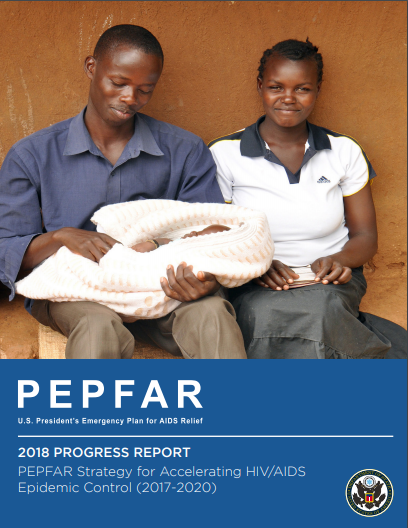A new US$ 30 million partnership to help end cervical cancer led by the United States President’s Emergency Plan for AIDS Relief (PEPFAR), the George W. Bush Institute and UNAIDS will accelerate life-saving efforts in eight African countries.
Studies show that women living with HIV are four to five times more likely to develop invasive cervical cancer. However, the disease is preventable through screening and early treatment of precancerous lesions. Early detection and treatment of cervical cancer can dramatically increase a woman’s chance of survival—women with preinvasive lesions have a five-year survival rate of nearly 100%.
Because of the high prevalence of HIV in sub-Saharan Africa, and because women in sub-Saharan Africa are not screened or treated as early or frequently as women in other parts of the world, cervical cancer remains the number one cancer killer of women in the region.
To address the disproportionate risk of cervical cancer among women living with HIV and the need for increased rates of screening and treatment in sub-Saharan Africa, PEPFAR the George W. Bush Institute and UNAIDS recently announced a new partnership—the Partnership to End AIDS and Cervical Cancer—designed to effectively eliminate cervical cancer deaths among women living with HIV in sub-Saharan Africa within a generation. The partnership will build on successful efforts over the past seven years of the Pink Ribbon Red Ribbon initiative and, pending Congressional approval, will be supported by an initial investment of US$ 30 million from PEPFAR.
“When we confront suffering—when we save lives—we breath hope into devastated populations, strengthen and stabilize society, and make our country and the world safer,” said President George W. Bush. “This week, we are announcing the next phase of our partnership with the United States President’s Emergency Plan for AIDS Relief and UNAIDS: a plan to effectively eliminate cervical cancer amongst HIV-positive women within a generation.”
The partnership will focus its work in eight sub-Saharan African countries where the burdens of HIV and cervical cancer are high—Botswana, Lesotho, Malawi, Mozambique, Namibia, Swaziland, Zambia and Zimbabwe. There are about 6 million women living with HIV in those eight countries. More than 100 000 women are diagnosed annually with cervical cancer in sub-Saharan Africa.
“The partnership will allow us to screen for, and treat, precancerous lesions among women living with HIV like never before,” said Michel Sidibé, the Executive Director of UNAIDS. “The partnership’s new strategy, which includes cervical cancer screening every two years for women living with HIV over the age of 30 years, aims to reduce cervical cancer incidence by 95% among this population in eight sub-Saharan African countries.”
The partnership will engage with governments in each of the countries to ensure that women and girls living with HIV are a priority in national cervical cancer prevention and control programmes. It will also leverage the powerful advocacy of first ladies, ministers, civil society, global health leaders and funders to improve implementation efforts and speed progress against the goal of eliminating cervical cancer.
“Thanks to the generosity of the American people, the United States President’s Emergency Plan for AIDS Relief has saved the lives of millions of HIV-positive women around the world,” said Deborah Birx, United States Global AIDS Coordinator and Special Representative for Global Health Diplomacy. “We must ensure these same women—mothers, daughters, aunts, and grandmothers—who are living with HIV and thriving do not succumb to cervical cancer.”
The new partnership builds on the successful efforts of the Pink Ribbon Red Ribbon initiative. Since its inception in 2011, Pink Ribbon Red Ribbon and its partners have screened more than half a million women for cervical cancer in Botswana, Ethiopia, the United Republic of Tanzania and Zambia, treated almost 32 000 women for precancerous lesions and vaccinated almost 150 000 girls aged 9–13 years against human papillomavirus type 2.



